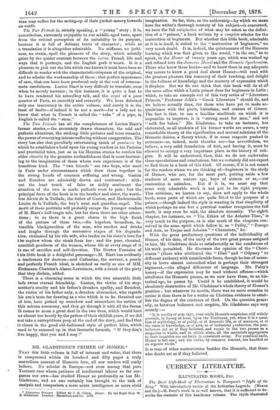MR. GLADSTONE'S PRIMER OF HOMER.* THAT this little volume is
full of interest and value, that there is compressed within its hundred and fifty pages a truly marvellous amount of Homeric lore, all our readers will easily believe. No scholar in Europe—not even among that pure Teutonic race whose patience of intellectual labour so far sur- passes our own—has studied Homer so profoundly as has Mr. Gladstone, and no one certainly has brought to the task of analysis and comparison a more acute intelligence or more vivid
• Literature Primers. Edited by J. R. Green. Homer. By the Right Hon. W. E. Gladstone. London; Macmillan and Co. 1878. imagination. So far, then, as the authorship—by which we mean here the writer's thorough mastery of his subject—is concerned, we have the full satisfaction of what may be taken as the defini- tion of a "primer," a book written by a complete scholar for the
instruction of beginners. But whether this little book, admirable as it is in itself, is suited to the "instruction of beginners," we
very much doubt. It is, indeed, the quintessence of the Homeric learning which was first given to the world, "in the ore," so to speak, in the Homer of twenty years ago, which was worked up and refined into the Juventus Hundi and the Homeric Synchronism. Those who know these books—and to know them in any adequate way means to know a good deal about Homer—will read with the greatest pleasure this summary of their teaching, and delight in the fullness of knowledge and the mastery of expression which it displays. But we do not think that this book will do at all the same office which a Latin primer does for beginners in Latin ; which, to take an example out of this very series of "Literature Primers," Professor Jebb's "Greek Literature" should do, and we believe actually does, for those who have yet to make ac-
quaintance with the poets, historians, and orators of Greece. The fact is that, to use a familiar similitude on which it is impossible to improve, it is "strong meat for men," and not "milk for babes." Mr. Gladstone, to take an instance, has elaborated, as all students of his former works are aware, a very remarkable theory of the signification and mutual relations of the Homeric deities, a theory which, if in some respects pushed to extremes—as, indeed, most theories are—has nevertheless, we
believe, a very solid foundation of fact, and having it, must be allowed to occupy a very important place in the history of reli- gion. It will be understood, then, that we do not undervalue these speculations and conclusions, but we certainly did not expect to find them in a book of this kind. Of course, if it is not meant for the readers whom we are thinking of—beginners in the study of Homer, who are, for the most part, putting aside a few students of more mature age, boys of sixteen or so,—our contention is mistaken. But if it is, we must say that some very admirable work is not put to its right purpose. This criticism, we hasten to say, does not apply to the whole book, some parts of which are quite fitted to the purpose of a primer,—though indeed the style is wanting in that simplicity of which perhaps no one but a practical teacher recognises the full merit, it may even be said, the absolute necessity. The eighth chapter, for instance, on "The Ethics of the Achaian Time," is very much to the purpose, as is also much of the chapters con- ceived in the same spirit which follow it, as "Polity," "Europe
and Asia, or Trojan and Achaian " "Characters," &c.
With the great preliminary questions of the individuality of Homer, of his date, of the unity of the two great poems assigned to him, Mr. Gladstone deals as satisfactorily as the conditions of his work permitted. He discusses the opinion of the " Chori- zontea " (those who attributed the " Iliad " and " Odyssey " to different authors) with considerable force, though he has of neces- sity to leave almost untouched what is perhaps their strongest argument,—the alleged difference of language. Mr. Paley's heresy—if the expression may be used without offence—which attributes the Homeric poems, as we now have them, to an his- torical age, he passes by. Could it be established, it would be absolutely destructive of Mr. Gladstone's whole theory of Homer's position ; but whatever its merits, there was no more occasion to
notice it than there is for a writer on Christian evidence to estab- lish the dogma of the existence of God. On the question gener- ally, as between believers and sceptics, Mr. Gladstone says very
acutely :—
" It is worthy of note that, even while Homeric scepticism still widely prevails, in theory at least, upon the Continent, yet, when it is a ques- tion of mythology, or of polity, or of domestic life, or of manners, or of the state of knowledge, or of arts, or of industrial production, the non- believers act as if they believed, and repair to the two poems as a magazine in which, and in which alone, all the materials appropriate to their inquiries are set forth in consistent array. For practical ends, Homer is but one ; and his works, by common consent, are handled as an organic whole."
It is true of other controversies besides the Homeric, that those who doubt act as if they believed.


































 Previous page
Previous page